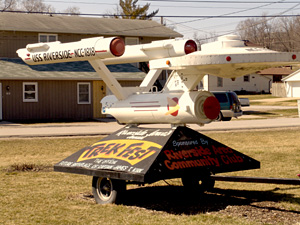Introduction
 | Riverside, Iowa: "The Future Birthplace of Capt. James T. Kirk" |
Fiction is an opportunity for exploration and discovery, especially in the more "fantastic" genres. Alternative or allegorical models of society, history, politics and science can be explored more freely, whereas more "traditional" kinds of narratives are probably bound to remain within the context of a more realist mode of storytelling - or so it appears.
Yet even the seemingly most aloft fantasy has a connection to reality, be it in the depiction of political, social, religious, philosophical or psychological motifs and issues. Star Trek, for instance, deliberately recurs to the motif of the frontier, thus claiming a specific American context. Other Science Fiction like Stargate: SG-1 and Atlantis stays closer to contemporary surroundings, establishing the fantastic within the realms of the known. The political allegories on Babylon 5 and the new rendition of Battlestar: Galactica as well as Star Trek have always allowed for comments in concrete circumstances, while still retaining multiple meanings by remaining within the framework of the allegory. Unlike directly political shows, taking up concrete day-to-day issues, like JAG and The West Wing, does the additional level of fantasy provide the work in question with staying power beyond the discussions of contemporary agendas?
The construction of fictional societies, hovering between the realization of the otherness of a non-place (ou-topos) and a possible hope for a good place (eu-topos), has moved from the depiction of fantastic islands to distant planets or "dimensions". This fictional extension of science, politics, religion and ecology has been posing ethical questions since the days of Plato's Atlantis story. Today's political utopias follow those of earlier authors like Thomas More, Francis Bacon, Thomaso Campanella, as well as Aldous Huxley and George Orwell. The ecological perspective can be found in forms as diverse as the depiction of erosion in Plato's Critias, the Godzilla series and Michael Crichton's Jurassic Park and the subsequent films.
The Utopian can also be found in less ostentatious places, however, just as shown by the strange timelessness of The Simpsons' Springfield, or even within the depictions of community in otherwise rather realist works like The Wire, establishing alternative universes commenting on contemporary reality.
Thus, the Seventh Annual Students Conference is dedicated to analyzing the various ways visions of community, society and science have been developed in literature and the visual arts.
Students of all faculties are invited to present their papers or just listen.
see also:
program flyer
promotional poster
|

